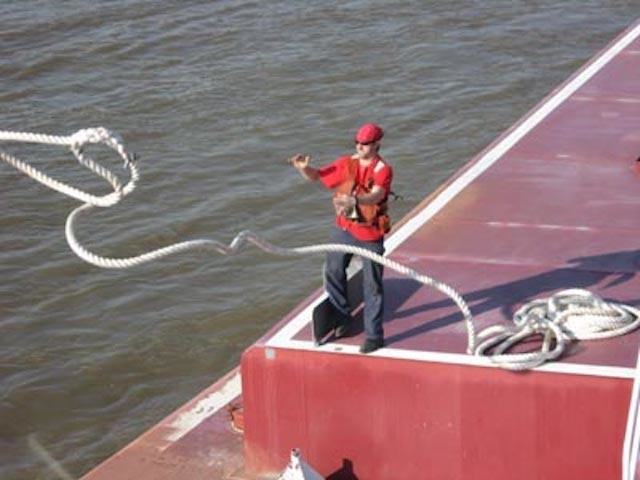We’re all learning to live with Covid — wearing masks less, going out more — and this includes the workboat industry.
While inland barge companies have kept some screening and testing protocols in place, concerns are waning about Covid-19 and its impact on the barging business. Reflecting what is happening nationally, operators report a drop in positive tests and fewer symptoms among their workers.
Things got pretty bad this winter, especially in January and February with the rapid spread of the Omicron variant. Several barge companies had so many workers out sick that they were forced to sideline boats and found it difficult to hire new workers due to the tight labor market. During the pandemic, the barge industry never stopped working as it was considered an essential industry to the economy.
“Omicron hit us pretty hard,” David Grzebinski, president and CEO of Kirby Corp., the nation’s largest tank barge operator, said in an April 28 earnings call. “At one point we had 15 boats down. We had to backfill with charters or other boats. It caused a lot of costs and disruptions. The good news is that it started to dissipate in March and things really started hopping.”
For the most part, Covid protocols have become integrated into daily operations, becoming another aspect of doing business and keeping crews safe.
“Members are dealing with it, the same way they deal with other operational challenges, like high or low water, ” Jennifer Carpenter, president and CEO of American Waterways Operators, said in an interview. “For better or worse, we now have two-and-one-half years of experience dealing with this thing, but (the pandemic) is not gone.”
“I think we’re in a good spot with it,” added Austin Golding of Golding Barge Line, Vicksburg, Miss. “We’re at a point that hopefully we can treat this as another illness. It’s not an operational hurdle for us at this point,” he said, adding Covid-19 vaccinations are still required of new hires.
Companies are beginning to assess lessons learned from the rapid Covid response they have had to implement over the past two years, which they liken to existing emergency response plans that are activated in times of hurricanes, droughts, floods or other emergencies.
“We all know how to deal with incidents,” said Kyle Buese, president of Pennsylvania-based Campbell Transportation Co., which moves liquid and dry cargo along the inland waterways. “It’s basically been a very long incident response. As new Covid requirements came out, we had to figure out how to adopt them and maintain compliance. We learned a lot about how to maintain a long-term incident command structure and how to communicate effectively and maintain accountability.”
The company has also made more expansive use of technology, such as conducting boat inspections. “Technology has become a bigger part of our business right now,” Buese said.




